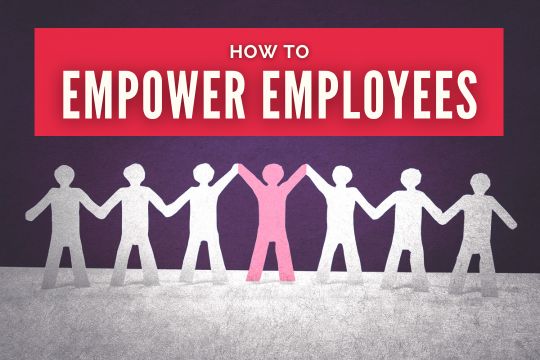
Leading a successful organization requires more than implementing efficient processes and systems and managing resources. It takes understanding how to foster employee empowerment, which can lead to increased job satisfaction and better performance outcomes. Empowering your employees means providing them with the resources and trust to take ownership of their decisions and contribute to the organization’s success. Employee empowerment can help create an environment of trust and collaboration, inspiring employees to work more effectively as team members and fostering company culture. As a leader, you must find creative ways to empower employees and make them feel like they are part of the organization’s mission. Tapping into their creativity and allowing them to take risks can lead to innovative solutions. Here are seven creative ways to empower employees in the workplace.

Before employees can take ownership of their work and trust themselves with decisions, they must understand your company’s vision. Communicating the “why” behind what you do gives employees the context and purpose to be motivated in their daily tasks. You should also provide an overview of how individual departments contribute to this shared mission. Hence, everyone understands how their roles fit the big picture and how each department is connected.
Share your vision regularly to keep employees up-to-date on company progress and provide opportunities for them to contribute with their ideas. Inviting employee feedback allows them to take ownership of the mission and be part of the decision-making process. Encourage employees to share their thoughts and opinions even if they challenge the status quo.
The more information you provide on job responsibilities and desired outcomes, the more your team will be better prepared to make decisions independently. When employees know what you expect from them, they will act without feeling like they need to consult you for every decision. Clearly defining expectations also helps ensure everyone stays on the same page regarding roles and responsibilities.
Ensure employees have all the information they need to complete tasks, such as access to resources, clear timelines, and feedback mechanisms. Do not assume employees know everything; be proactive and provide the necessary information to feel confident in their decisions. According to Harvard Business Review, one of the mistakes leaders make is failing to set clear expectations to guide their teams. As a result, employees’ actions are misaligned, and their decisions do not contribute to the organization’s success.
Giving your team members control over their work can help build trust and foster a sense of autonomy in the workplace. When employees have control over how they approach tasks and choose the methods to complete assignments, they are more likely to feel empowered and motivated. This can be as simple as letting them make decisions on how they structure their day or allowing them to choose which tasks they focus on first.
Micromanaging employees can undermine their autonomy and sap their motivation. Allowing them to make decisions within a given framework allows them to work more independently without sacrificing accountability. This can also build trust between leaders and team members and positively impact employee engagement.

Coaching and mentoring employees can help them develop the necessary skills and experience to make more informed decisions. Offering guidance on improving their performance or helping them work through challenges helps build trust and confidence in their decision-making ability. Provide feedback regularly to let employees know you care about their development and are invested in helping them move forward in their careers.
Other creative ways to empower employees include providing access to learning and development opportunities. Offering courses on project management, customer service, problem-solving, and communication can help employees build their skillset and increase their confidence in decision-making. Also, allow employees to take time away from their everyday duties to focus on professional development and personal growth.
Employees need to know that they are valued and respected. When employees make mistakes, provide constructive feedback respectfully. Show them that you are willing to own up to any mistakes you make and explain how the team can learn from each experience. Encourage employees to take risks, even if it means making mistakes, and appreciate their effort.
When employees make good decisions, show your appreciation. Acknowledge the work they have done and thank them for their efforts. Organize monthly or quarterly awards to recognize exemplary performance or create a rewards system to incentivize employees with outstanding performance. These small gestures are essential for job satisfaction. When employees are satisfied, they get customers to spend more, which can directly contribute to the growth and success of the organization.
Listening to their feedback and perspectives is the best way to understand how employees make decisions. Set up regular meetings for open dialogue between leaders and team members, or establish an online platform where employees can anonymously give feedback. This will show employees that you value their opinion and encourage them to feel comfortable voicing their views.
Gather employee feedback regularly to gain insight into what is happening within the team and how the organization can improve decision-making processes. Tapping into employees’ collective knowledge and experience is the best way to ensure that decisions are informed and aligned with the company’s goals. Employee feedback also helps you understand how your business is listed and reviewed. Knowing the opinions of current customers, potential customers, and competitors can help you understand how your business is seen in the market.

Ensure that employees have enough time away from work to rest and recharge. Encourage team members to take regular vacation days and stay-cations so they can return feeling energized and ready to make good decisions. Allowing employees the opportunity for relaxation and renewal helps them stay refreshed and focused on their work.
Work-life balance helps create a positive work environment where employees feel secure and enjoy their job. Failing to provide employees with enough time off can lead to burnout and reduce the quality of their work. Creating flexible working arrangements like remote or part-time options can help employees manage stress and increase productivity.
You need to implement these strategies to empower employees and create a work environment that fosters collaboration and encourages creativity if you want to remain competitive in your industry. E-Marketing Associates can help you understand how your business is listed online and gain insight into customer behaviors so that you can make better decisions. Knowing how is your business listed can help you improve your customer experience, increase average spend per customer and gain a competitive edge in the market.
Employee empowerment is the practice of giving team members the resources, information, and authority they need to make decisions and take ownership of their work. It replaces micromanagement with trust, boosting motivation, creativity, and accountability while aligning individual efforts with organizational goals.
Share the mission and the reasons behind it through town-halls, newsletters, dashboards, and one-on-one conversations. Explain how every department and role supports the bigger picture, invite questions, and routinely report progress. This context lets employees connect daily tasks to company purpose and act confidently.
Clear expectations give employees a decision framework. When people know objectives, deadlines, and available resources, they can act without constant approval, avoid duplicated effort, and keep their choices aligned with business priorities. Clarity reduces anxiety, increases speed, and prevents the misaligned actions that hurt results.
Regular coaching and mentoring supply guidance, feedback, and new skills. Leaders become partners in growth, helping staff solve problems, set development goals, and practice new responsibilities safely. As confidence rises, employees feel trusted to innovate and make bigger decisions, strengthening talent pipelines and retention.
Time off is a strategic empowerment tool. Encouraging vacations prevents burnout, lets minds recharge, and signals that wellbeing matters more than face time. Rested employees return with fresh ideas, better focus, and healthier engagement levels, enabling them to make higher-quality decisions and sustain productivity long term.